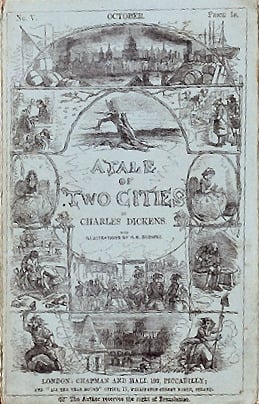
A Tale of Two Cities (Chap 2.17) Charles Dickens
На этой странице вы найдете полный текст песни "A Tale of Two Cities (Chap 2.17)" от Charles Dickens. Lyrxo предлагает вам самый полный и точный текст этой композиции без лишних отвлекающих факторов. Узнайте все куплеты и припев, чтобы лучше понять любимую песню и насладиться ею в полной мере. Идеально для фанатов и всех, кто ценит качественную музыку.

One Night
Never did the sun go down with a brighter glory on the quiet corner in Soho, than one memorable evening when the Doctor and his daughter sat under the plane-tree together. Never did the moon rise with a milder radiance over great London, than on that night when it found them still seated under the tree, and shone upon their faces through its leaves.
Lucie was to be married to-morrow. She had reserved this last evening for her father, and they sat alone under the plane-tree.
"You are happy, my dear father?"
"Quite, my child."
They had said little, though they had been there a long time. When it was yet light enough to work and read, she had neither engaged herself in her usual work, nor had she read to him. She had employed herself in both ways, at his side under the tree, many and many a time; but, this time was not quite like any other, and nothing could make it so.
"And I am very happy to-night, dear father. I am deeply happy in the love that Heaven has so blessed—my love for Charles, and Charles's love for me. But, if my life were not to be still consecrated to you, or if my marriage were so arranged as that it would part us, even by the length of a few of these streets, I should be more unhappy and self-reproachful now than I can tell you. Even as it is—"
Even as it was, she could not command her voice.
In the sad moonlight, she clasped him by the neck, and laid her face upon his breast. In the moonlight which is always sad, as the light of the sun itself is—as the light called human life is—at its coming and its going.
"Dearest dear! Can you tell me, this last time, that you feel quite, quite sure, no new affections of mine, and no new duties of mine, will ever interpose between us? I know it well, but do you know it? In your own heart, do you feel quite certain?"
Her father answered, with a cheerful firmness of conviction he could scarcely have assumed, "Quite sure, my darling! More than that," he added, as he tenderly kissed her: "my future is far brighter, Lucie, seen through your marriage, than it could have been—nay, than it ever was—without it."
"If I could hope that, my father!—"
"Believe it, love! Indeed it is so. Consider how natural and how plain it is, my dear, that it should be so. You, devoted and young, cannot fully appreciate the anxiety I have felt that your life should not be wasted—"
Never did the sun go down with a brighter glory on the quiet corner in Soho, than one memorable evening when the Doctor and his daughter sat under the plane-tree together. Never did the moon rise with a milder radiance over great London, than on that night when it found them still seated under the tree, and shone upon their faces through its leaves.
Lucie was to be married to-morrow. She had reserved this last evening for her father, and they sat alone under the plane-tree.
"You are happy, my dear father?"
"Quite, my child."
They had said little, though they had been there a long time. When it was yet light enough to work and read, she had neither engaged herself in her usual work, nor had she read to him. She had employed herself in both ways, at his side under the tree, many and many a time; but, this time was not quite like any other, and nothing could make it so.
"And I am very happy to-night, dear father. I am deeply happy in the love that Heaven has so blessed—my love for Charles, and Charles's love for me. But, if my life were not to be still consecrated to you, or if my marriage were so arranged as that it would part us, even by the length of a few of these streets, I should be more unhappy and self-reproachful now than I can tell you. Even as it is—"
Even as it was, she could not command her voice.
In the sad moonlight, she clasped him by the neck, and laid her face upon his breast. In the moonlight which is always sad, as the light of the sun itself is—as the light called human life is—at its coming and its going.
"Dearest dear! Can you tell me, this last time, that you feel quite, quite sure, no new affections of mine, and no new duties of mine, will ever interpose between us? I know it well, but do you know it? In your own heart, do you feel quite certain?"
Her father answered, with a cheerful firmness of conviction he could scarcely have assumed, "Quite sure, my darling! More than that," he added, as he tenderly kissed her: "my future is far brighter, Lucie, seen through your marriage, than it could have been—nay, than it ever was—without it."
"If I could hope that, my father!—"
"Believe it, love! Indeed it is so. Consider how natural and how plain it is, my dear, that it should be so. You, devoted and young, cannot fully appreciate the anxiety I have felt that your life should not be wasted—"
Комментарии (0)
Минимальная длина комментария — 50 символов.












